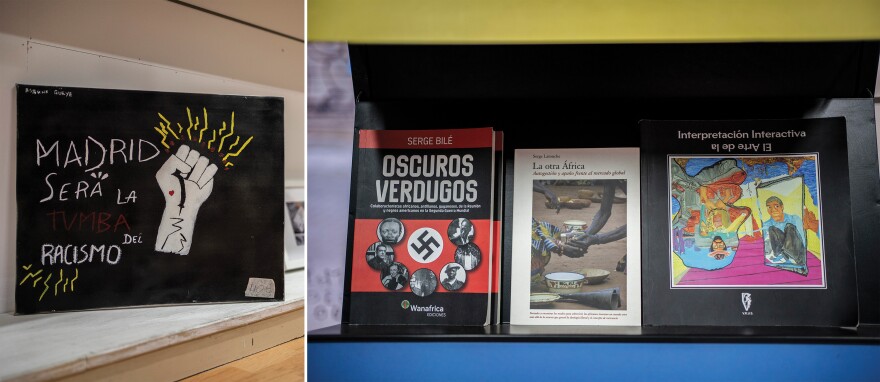Updated July 11, 2022 at 8:29 AM ET
MADRID — On a narrow street in the Lavapiés neighborhood, there's a small store with a special story behind it.
Like any tourist shop, it sells clothes and other knickknacks for eager-eyed passersby.
But this store, called Pantera, is different because of who runs it: a collective of street vendors who came together to create safer working conditions for themselves.
The store is celebrating its first anniversary this month.

On the street, the vendors are called manteros, named for the practice of laying out their merchandise on blankets, or mantas. The manteros sell a variety of clothing and original creations — pieces like knock-off sneakers, scarfs, sunglasses and jerseys. Most manteros here are immigrants from Senegal.

This line of work can be incredibly grueling and unsafe, given the near-constant threat of Madrid's police. Manteros often illegally sell counterfeit brand-name goods. They say they face extra harassment, however, because they are Black and because of their status as undocumented immigrants.
That's why they came together to make the Sindicato de Manteros, or Manteros Union — and to purchase the store to create a place to safely sell their merchandise.
"We have organized the union because it was the only way to survive," says Malick Gueye, a spokesperson for the union. Originally from Senegal, Gueye has lived in Spain for 17 years. "Here in Madrid, they see us as enemies, because it's a very rough city," he says.
The shop's walls are covered with T-shirts and tote bags. Children's books about social justice heroes are displayed on a rack against one wall.

"Everything here is significant, because a lot of the shirts we sell denounce racism," Gueye says.
The collective has its own brand, also called Pantera, inspired by the activism of the Black Panthers. One shirt depicts a famous moment from the 1968 Summer Olympics, where U.S. sprinters Tommie Smith and John Carlos raised their fists and bowed their heads as they stood on the medal stand. In the image on the Pantera shirt, Tommie Smith stands on the center podium, holding a folded-up manta in his hand.

The store is a direct response to the racism and isolation many manteros say they experience. It also reveals a lot about the immigrant experience in Spain.
Being a mantero is a way to get by when they have few opportunities because of their undocumented status, Gueye says.
They live in fear; fear that they could be detained by the police at any time, specifically for selling counterfeit goods. They could be sent to a detention center for undocumented immigrants.

He also says they're often stopped by the police for no apparent reason, just walking down the street. Their visibility on the streets makes it even more difficult to stay out of trouble with law enforcement.
That's why the storefront has become so important for this community. In a bid to stave off any police attention, all the clothing in the store is legitimate and the store has all the proper documentation.
And Gueye wants the union and the store to help change the narrative about African immigrants, who he says are often portrayed as criminals.
They are not criminals, he says, they are just people who have traveled great distances — often under very dangerous circumstances — to try to have a different life.
Copyright 2023 NPR. To see more, visit https://www.npr.org.





